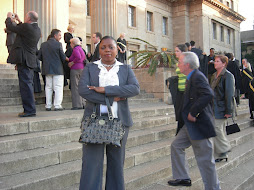Although discussions have focused on crucial issues, such as the quality of infrastructures (stadiums, hotels, transport, etc.), the anticipated economic benefits that might accrue to the country for hosting this mega-event, and the implications of the rate of crime in the organisation, I would like to argue that the success of this event lies on one important factor: the celebration of the event as an “African Festival”.
This does not mean that the infrastructural aspect, the economic benefits, and other aspects mentioned above are less important. We really believe that South Africa, as a responsible State and with 2/3 of all African GDP, by accepting to host the World mega-event, will mobilize all the necessary means to overcome all the obstacles which still exist. I, therefore, believe that the material side of the overall investments will not be the reason of any failure.
What I strongly support is the view according to which, the success of this event depends on how the whole continent will come together to celebrate it as a continental Festival. We know how soccer, today, affects the everyday lives of millions of people throughout the world in many similar – as well as quite different – ways. Soccer also retains the capacity to re-invigorate ‘national pride’. The 2010 World Cup is, therefore, an opportunity for the continent to give to the World another image, different of all forms of negativity that people abroad have of Africans. This is an extraordinary opportunity for Africans to tell to the rest of the world that Africa is not a land of misery[1], poverty, disease (HIV/Aids, etc.), crime, death, and so forth… Africa is really a continent where people can live joyfully, connected to each other; ready to help those in distress; a continent where life is celebrated with joy, and a continent where life is sacred and respected; a continent, where the stranger is welcomed with dignity and is associated to celebrate the joy of life with the natives. However there is ongoing debate as to how all this will be achieved?
Obviously, certain conditions should prevail in order for the festival to be a success. First of all, it will be important that poor people have access to the games, directly or through media (TV and radio). Fortunately, on Monday 31 of March the Fifa General Secretary, Jerome Valcke, announced that the SABC – the Official Fifa broadcasting partner – does not need a licence to broadcast the 2010 World Cup and, therefore, all South Africans will be able to watch the games for free on SABC TV. Secondly, Africa will come together as a whole to the 2010 World Cup, if at least two or three African teams cross the quarter-final. The performances of African teams during the tournament will play a major role throughout the continent and will, of course, re-invigorate the pride to be African all over the continent. Thirdly, it will be also important for the host country to reach at least the semi-final, in the absence of reaching the final. As I said above, South Africa is able to mobilize the necessary means to reach such an objective. The appointment of an experimented coach, with numerous achievements at his side, for the national team is a predictable sign that a miracle can happen to Africa, especially to South Africa, to reach this stage of the tournament. Of course, much more needs to be done to consolidate and to unify the team, particularly regardless the relatively poor results in recent Afcon in Ghana. However, there is more optimism than pessimism for the team’s performances during the tournament. “Two years are enough to build a team”.
Finally, the tournament is expected from mid of June to mid of July 2010. This is a crucial period of winter in South Africa. Naturally, the climate will affect the atmosphere of fans and spectators. FIFA might consider reviewing the possibility of delaying the event for two months, as this can contribute to bring more joy and more colours to the event with the sunshine of the earlier summer 2010.
To conclude, I believe that the 2010 Soccer World Cup success depends on how Africans will unite to celebrate this mega-event.
[1] In 1994, an Ivorian student in the USA - Myriam Montrat – was writing that ‘the vision of Africa in the American mind is shaped by mostly the news media. If by chance you find an article about Africa in the newspaper it will probably be five-line article or an article about something negative that happened there. The emphasis is generally put on corruption, poverty, civil war… On the contrary, the African culture and history as reflected in African art, poetry, music, dance and movies is rarely a topic for media discussion. (…) Misery is the media’s favourite topic of coverage: starvation, disease, deaths of millions of people, homeless problems and AIDS” (Myriam MONTRAT, “From the Heart of An African”, Issue: A Journal of Opinions, vol. 22, No. 1, Winter 1994, p. 5-6. This view is applicable to the rest of the world.
Subscribe to:
Post Comments (Atom)





No comments:
Post a Comment